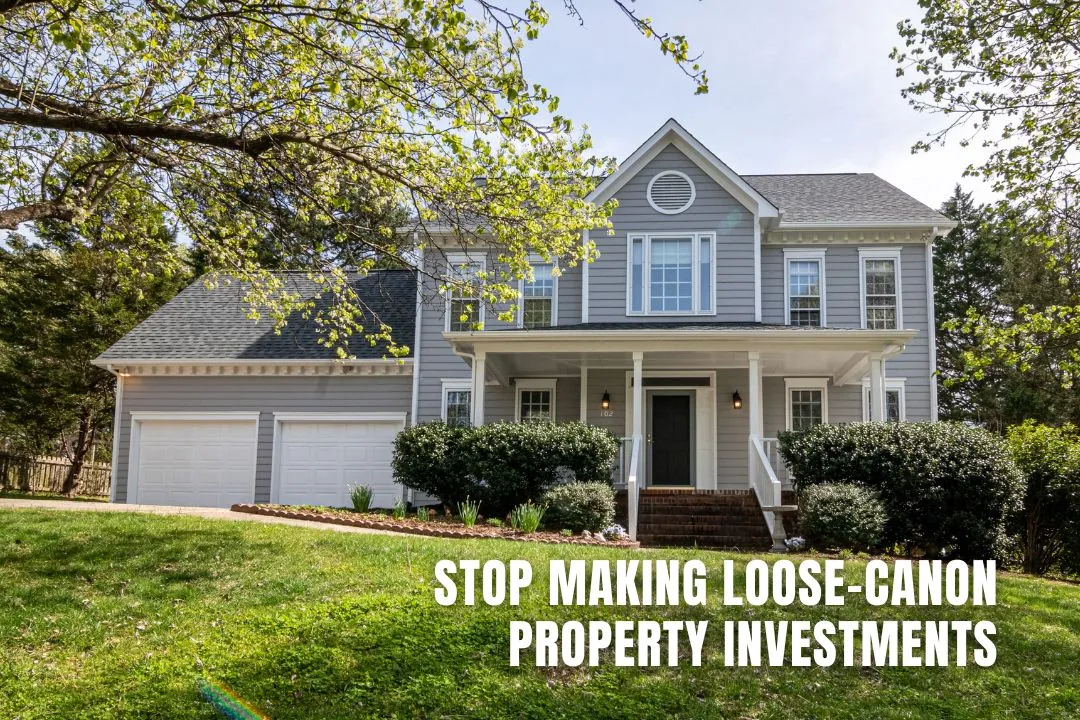Stop Making Loose-Canon Property Investments
November 21, 2024

Buying property is a huge thing, but most of them - property investors, of course - have jumped in like kids in a candy store- only to end up with a bellyache. In order not to transform your dream of property ownership into a cautionary story, let's take a closer look at the thin line between a good investment and one that will eat your money.
Key Takeaways on Making Smarter Property Investments
- The Glitter Trap: Don't fall for the glamor. A property with a stunning view or high-end address may look appealing, but these features don’t necessarily equate to solid returns. Focus on investment potential, not aesthetics.
- Numbers Tell All: Emotional decisions can lead to poor investments. Always base your property choices on key metrics like rental yield, appreciation potential, and cash flow to ensure a solid return.
- Know the Local Game: Real estate markets vary greatly from place to place. What works in one city might fail in another. Research local trends, such as infrastructure development and job growth, to find the best opportunities.
- The Hidden Bomb of Cost: Be wary of properties with hidden financial burdens like high maintenance costs, taxes, or association fees. These can quickly eat into your profits, turning a seemingly good investment into a money pit.
- Investment or Money Eater?: Always ask yourself if the property could generate a profit if rented or resold tomorrow. If not, it's time to reconsider. Focus on areas with demand and growth potential for better returns.
- Think Like a Business Owner: Investing in real estate is like running a business. You’re buying potential, not just property. Make strategic, informed decisions for long-term profits rather than emotional, hasty ones.
- Smart Property Choices Involve Strategy: Avoid being swayed by sentimentality or charm. A solid investment requires strategy and research. Be diligent in your property evaluations to ensure you're buying for profit, not regret.
Register Your LLC
Company Registration
START NOWThe Glitter Trap
It's not always gold. It's so easy to get suckered into a property that smells of the next big thing. A view to die for, sleek interiors, or a high-brow address can cloud your judgement. But here's the catch: glamour doesn't always equate to good returns.
Less the romantic and more of an investor, one has to think beyond the cosmetic. The question is never, "Do I love this property?" Instead, it should be, "Will someone else love renting or buying this property at a profit for me later?" That romanticising of a purchase leads one many a time into what I call the "glitter trap" - a shiny object that empties pockets instead of filling them.
Numbers Tell All, but You Could Be Blind to Them
Emotions often overpower reason, and your investment decisions should be harnessed on cold, hardcore numbers. When going through the valuation process of a property, make sure you stay focused on metrics such as rental yield, appreciation potential, and cash flow.
When going through the valuation process of a property, make sure you stay focused on metrics such as rental yield, appreciation potential, and cash flow.
Is there a realistic path to income production? Will the local market support its growth? O.K., not the sexy questions, but these are the ones that distinguish the shrewd investor from the "silly goose.".
Know the Local Game (Not Just the Hype)
Every market has its own nuances, and a great deal in one city could be a disaster in another. Don't get caught up going with the herd; what worked for your cousin in Phoenix may not do anything but flop in your neck of the woods. That's where research comes in. Local trends: study them. What is driving the market-infrastructure projects coming, job markets booming, or population growth? To the smart investor, these details are like a compass, showing the right kind of opportunities.
The Hidden Bomb of Cost
Beware of properties with financial strings attached. Maintenance nightmares, high property taxes, and association fees quietly nibble at your profits until they are gone. That charming vintage home might double as a money pit if it's only plagued with endless repairs.
Do a cost-benefit analysis just before you commit. Is there some fine print masking the hidden costs? A very good investment is not all about what you will gain but rather how much you will lose.
Investment or Money Eater? A Litmus Test
Here's the final litmus test: If you had to rent or resell the property tomorrow, would you turn a profit? If the answer isn't a confident yes, it's time to reconsider buying the property. The same comes for long-term projections. If such a property exists in a locality where real estate values are projected to grow, then it is worth looking at. Opt for places that boast demand, stability, and potential rather than charm or hype.
Think Like a Business Owner
At the end of it all, the process of investing in real estate is basically similar to running a business venture. You are not merely buying walls and a roof; you are buying potential. A good investment will pay you back in dividends, while a poor one silently bleeds you dry. o step up, do your homework, and don't get blinded by the glittery façade. Smart property choices involve strategy, not sentimentality. Keep in mind that your future self will be thanking you when you are counting profits, instead of nursing regrets.

